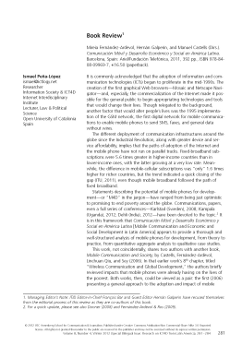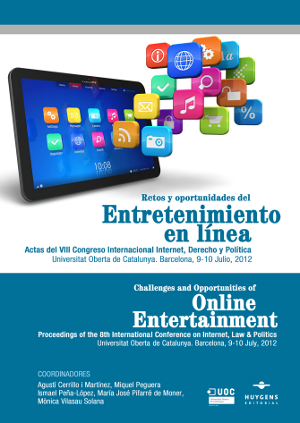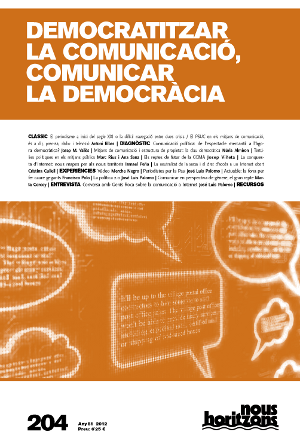20121213
By Ismael Peña-López
Main categories: ICT4D, News
Other tags: m4d
No Comments »
Information Technologies & International Development journal has just published its Vol 8, Issue 4 Winter 2012, a special bilingual issue featuring research on ICT4D from Latin America.
This issue features a piece written by me, the book review of Comunicación móvil y desarrollo económico y social en América Latina [Mobile communication and economic and social development in Latin America], by Mireia Fernández-Ardèvol, Hernán Galperin and Manuel Castells. As a bilingual issue, my book review has both been published in English and Spanish: please follow the links below to download the reviews.
It is worth reminding that, back in September 2011, Manuel Castells offered a presentation of the book which I attended. My notes can be read at Mobile communication and economic and social development in Latin America.
20120710
By Ismael Peña-López
Main categories: Cyberlaw, governance, rights, e-Government, e-Administration, Politics, Information Society, Meetings, News
Other tags: idp | idp2012
No Comments »
The proceedings of the 8th International Conference on Internet, Law & Politics (IDP 2012): Challenges and Opportunities of Online Entertainment. will be free for download in the following days on this page.
Content, besides some minor editing, has followed the originals, so the reader will find both articles in Spanish or English.
To cite this works use, please, any of the following references:
Cerrillo i Martínez, A., Peguera, M., Peña-López, I., Pifarré de Moner, M.J., & Vilasau Solana, M. (coords.) (2012). Retos y oportunidades del entretenimiento en línea. Actas del VIII Congreso Internacional, Internet, Derecho y Política. Universitat Oberta de Catalunya, Barcelona 9-10 Julio, 2012. Barcelona: UOC-Huygens Editorial.
Cerrillo i Martínez, A., Peguera, M., Peña-López, I., Pifarré de Moner, M.J., & Vilasau Solana, M. (coords.) (2012). Challenges and Opportunities of Online Entertainment. Proceedings of the 8th International Conference on Internet, Law & Politics. Universitat Oberta de Catalunya, Barcelona 9-10 July, 2012. Barcelona: UOC-Huygens Editorial.
8th Internet, Law and Politics Conference (2012)
20120614
By Ismael Peña-López
Main categories: Development, News, Nonprofits, Online Volunteering, Participation, Engagement, Use, Activism, Writings
Other tags: francesc_balague
5 Comments »
Some months ago, professor in Social Pedagogy Xavier Úcar approached Francesc Balagué and I and told us he was very worried: after many years working in the field of community action, the Internet had come and changed every definition we had on what a community was, and changed every definition we had on what interaction (or action) was too. He had just found out that community action might be lagging behind the pace of times. And he invited us to write a book on the new communities and how did they interact on the net, so that he and his colleagues could use it to catch up with new scenario after the digital revolution.
An appealing invitation as it was, we had grounded reasons not to accept it: one of us is a pedagogue specialised in instructional technology and the other one an economist specialised in the impact of ICTs and development. Thus, we knew almost nothing about community action, and only had a chaotic approach to new expressions of communities working together in the most different types of ways and goals. That is precisely the point
, stated professor Úcar.
Hence the heterodoxy of the inner structure of the book that has just seen the light. Acción comunitaria en la red (Community action in the net) is neither a book on community action nor a book with very clear ideas. It is, but, a book that invites the reader to think, to elaborate their own conclusions, and to find out which and whether these conclusions can be applied and how to their own personal or professional cases.
The full book has been written by 15 authors and presents 8 case studies that depict and analyse how a specific community used the Internet and its different tools and platforms to share information, communicate amongst them, organize themselves and coordinate actions in order to achieve their particular goals. The structure of the chapters analysing the cases was totally free, but some relevant questions had to be answered somehow:
- What were the history, motivations, goals of the community?
- What led the community to use the Internet? How was the community articulated digitally? what provided the Internet that could not be found offline?
- How was the process of adoption of digital technologies, what tools and why?
- What happened to the sense of membership, identity, participation?
- What was the role of the mediator, facilitator, leader and how does it compare with an offline leadership?
- Is self-regulation possible? How was conflict handled?
- How is digital knowledge, experiences and learning “brought back” to the offline daily life and put into practice?
The cases are preceded by two introductory chapters, a first one on the social web and virtual participation, and a second on digital skills, as we thought some common background would help the reader to better understand some digital practices (and jargon). The book closes with what we, both authors, learnt during the preparation of the book and from reading other people’s chapters. This concluding chapter can be used too as a guideline for the preceding cases.
Table of contents
From the official page of the book Acción comunitaria en la red at Editorial Graó.
- Introduction, Francesc Balagué, Ismael Peña-López.
- What is the Web 2.0? New forms of participation and interaction. Francesc Balagué.
- Brief introduction to digital skills. Ismael Peña-López.
- APTIC. A social networking site for relativos of boys and girls with chronic diseases and conditions. Manuel Armayones, Beni Gómez Zúñiga, Eulàlia Hernández, Noemí Guillamón.
- School building: new communities. Berta Baquer, Beatriu Busquets.
- Social networking sites in education. Gregorio Toribio.
- Networked creation and the Wikipedia community. Enric Senabre Hidalgo.
- Social networking sites in the Administration: the Compartim programme on collaborative work. Jesús Martínez Marín
- Local politics, organizations and community. Ricard Espelt
- Towards cyberactivism from social movements. Núria Alonso, Jordi Bonet.
- Mobile phones, virtual communities and cybercafes: technologicla uses of international immigrants. Isidro Maya Jariego
- Concluding remarks. Ismael Peña-López, Francesc Balagué
Acknowledgements
There is a lot of people to be thankful to for making the book possible.
The first one is Xavier Úcar. I have only seldom been granted such a degree of total confidence and trust, not only in my work but in myself as a professional. He was supportive and provided guidance to two ignorants in the field. He totally gave us a blank cheque and one of my deepest fears during the whole process was — and still is — to have been able to pay him back with a quality book. I really hope it has been so.
The authors of the case studies were just great. Some of us did not know each other and I can count up to three people which I still have to meet personally (i.e. offline). They also trusted in us and gave away a valuable knowledge and work that money won’t pay. Many of them won’t even make much use of adding a line on their CVs for having written a book chapter. I guess this is part of this sense of new communities that the whole book is talking about.
My gratitude (but also apologies) to Antoni Garcia Porta and Sara Cardona at Editorial Graó. I am fully aware that we made them suffer: we succeeded in transferring some of our chaotic lives to them when they had not asked to. Being an editor today must be both a thrilling and a difficult challenge. We all gave away time in the making of the book but the published they represent invested money too, and that is something that we quickly forget these days.
Last, but absolutely not least, it has been a real pleasure working with Francesc. I think we only met once during the whole process: when Xavier invited us to coordinate the book. Francesc then packed and went around the world for 14 months. Luckily he took his laptop and would connect every now and then. Our e-mail archive and Google Documents can testify that almost everything is possible if there is the will to do it.
And it was fun too. Oh, yes it was!
20120421
By Ismael Peña-López
Main categories: Cyberlaw, governance, rights, News, Writings
4 Comments »
Nous Horitzons — the review of the Fundació Nous Horitzons — has released issue #204 with the quite explicit title of Democratizing communication, communicating democracy (original title: Democratitzar la comunicació, comunicar la democràcia).
I was asked to write a piece where to reflect about what can be done and what cannot be done on the Internet
, in the sense of what is allowed, what is not, where are the boundaries of our civic rights, where do different rights collide (e.g. freedom of expression vs. intellectual property rights), etc.
My article, The conquest of Internet: new maps for new territories, is originally written in Catalan (La conquesta d’Internet: nous mapes per als nous territoris — Spanish translation also available) and takes its title from William Gibson’s documentary No Maps for These Territories!.
I ended writing what it looks like a slightly different thing: that there is not an actual collision of rights, but the dawn of a totally new model of society. And what looks like a collision of rights is, indeed, the fight to set up new institutions, appoint new leaders and shape up this new model according to each one’s own views. Thus, the apparent collision of rights is but the symptom of a higher level matter: what is the “global order” going to look like in the next decades after the actual order, based on the industrial paradigm, has become obsolete by Information and Communication Technologies.
I want to heartily thank Marc Rius for the invitation to write this piece, for his patience on my repeated delays and, most especially, for not changing a single comma on what I acknowledge is a dense text that goes way beyond the simple answer to what can and cannot be done on the Internet.
Downloads
20120413
By Ismael Peña-López
Main categories: e-Readiness, Information Society, Meetings, News, Participation, Engagement, Use, Activism
Other tags: debatesic
No Comments »
(crossposted from Debates sobre tendencias de la Sociedad de la Información y el Conocimiento).
With the goal to analyse and propose a debate on the nature and depth of this new framework of social relationships, the challenges it entails, for example, from the point of view of social inclusion, or opportunities from the perspective of health systems, social participation and education
a series of conferences has been planned in Seville (Spain): [sic]*: Conference series on trends in the Information and Knowledge Society
The conferences are made up by six debates, and I am taking part in two of them:
1. Introductory session. 18 april 2012.
- Topics: information society, network society and technological revolution, how ICTs have penetrated into European, Spanish and Andalousian societies, and what are or what should be the public policies in this area.
- Participants: Eva Piñar, General Director of Technological and Information Society services at the Andalousian government; Ramón Compañó, programme coordinator at IPTS-JCR; Josep Lladós, director of the PhD on Information and Knowledge Society at UOC.
2. Progressing towards the Information Society. 2 may 2012.
- Topics: present of the implementation of ICT at different levels: infrastructure, knowledge economy, legal framework, content and services. And delving into the economic dimension of the information society: business, resources, innovation, etc..
- Participants: Ismael Peña-López, professor a the School of Law and Political Science at UOC; Marc Bogdanowic, leader of the Information Society Unit at IPTS-JCR.
3. Technological prospective. 16 may 2012.
- Topics: what will be the future technologies, usage standards, protocols, etc..
- Participants: César Córcoles, professor at the School of Computer Science, Multimedia and Telecommunication at UOC; a TBC representative from IPTS.
4. ICT and Education. 6 june 2012.
- Topics: aspects of the relationship between training and ICT, how educational technology is already helping to change the way it delivers training, how can ICT help in shaping tomorrow’s education.
- Participants: Magí Almirall, director of the Office of Learning Technologies at UOC; Yves Punie, senior scientist at the Information Society Unit at IPTS-JCR.
5. ICT for Health. 20 june 2012.
6. ICT and citizen participation. 4 july 2012.
- Topics: how ICT have changed the relationship between citizens and the government, what are the new forms of participation based on the use of ICT, Transparency, e-government, etc.
- Participants: Ismael Peña-López, professor a the School of Law and Political Science at UOC; Gianluca Misuraca, researcher at the IPTS-JCR.
The [sic]*: Conference series on trends in the Information and Knowledge Society is organized by the General directorate of Technological and Information Society services of the Andalousian Government, the Institute for Prospective Technological Studies of the European Commission, and the office in Seville of the Open University of Catalonia (UOC).
I want to thank Eva Piñar and Alfredo Charques both for the initiative to organize the conference — when reflecting on what kind of Information Society we want is so necessary — and, of course, for inviting me to take part in it.
20120401
By Ismael Peña-López
Main categories: Education & e-Learning, ICT4D, News, Writings
Other tags: ceibal
1 Comment »
Plan Ceibal is the one-to-one laptop programme that Uruguay is running nation-wide since 2008. It is, in my opinion, a good example of what I would like to see in this kind of programmes. I spoke a little bit more on that programme on From laptops to competences: bridging the digital divide in higher education, but for a brief approach, these are the three main aspects that I like most:
- It is not a one-to-one laptop programme, but an inclusion through education programme. Laptops really come into the programme as a tool.
- The core of the programme is the community, the neighbourhood, the classroom, and not technology. It is social capital — and not technological capital ‐ what is built as a priority.
- They run a honest, thorough, yearly evaluation which highlights the best achievements, identifies the weaknesses and feeds the programme back with rich and useful information.
One of the main commitments of the programme is to create resources for the educators involved in it, including the yearly publication of a book. The latest edition of the “Ceibal book” has already been published as El modelo CEIBAL: Nuevas tendencias para el aprendizaje and I have contributed to the book with a chapter.
My chapter, Educación y Desarrollo en un mundo de redes (Education and development in a world of networks) is a reflection on how ICTs are radically changing what we understand by teachers, educational resources, and infrastructure. It actually is a slight adaptation of the homonymous materials that I had recently prepared for UNDP’s Virtual School.
The resulting chapter is the result of the contributions of some other people with which I am in much debt. Giovanni Guatibonza and Amagoia Salazar more than supervised the first edition for the UNDP, providing very good guidance and suggestions, which I all add to the text. Marion Ikwat is an astonishing editor and proofreader that did not rest until the final text was utterly spotless. Last, I want to thank Graciela Rabajoli not only for inviting me to be part of the book, but for all the information on the programme that she has always fed me with.
Downloads:
Bibliography used in Educación y Desarrollo en un mundo de redes
Adell, J. & Castañeda, L. (2010). “
Los Entornos Personales de Aprendizaje (PLEs): una nueva manera de entender el aprendizaje”. In Roig Vila, R. & Fiorucci, M. (Eds.),
Claves para la investigación en innovación y calidad educativas. La integración de las Tecnologías de la Información y la Comunicación y la Interculturalidad en las aulas. Stumenti di ricerca per l’innovaziones e la qualità in ámbito educativo.. Alcoy: Marfil – Roma TRE Universita degli studi.
Cabero, J. (2006). “
Bases pedagógicas del e-learning”. In
Revista de Universidad y Sociedad del Conocimiento (RUSC), 3 (1). Barcelona: Universitat Oberta de Catalunya.
de Haro, J. J. (2010).
Redes sociales en educación. Ponencia para la Jornada Educar para la Comunicación y la Cooperación Social, Universidad de Navarra, 28 de mayo de 2010. [online]: EDUCATIVA.
Sen, A. (1980). “
Equality of What?”. In
The Tanner Lecture on Human Values, I, 197-220. Cambridge: Cambridge University Press.
Serrano, J. & Prats, J. (2005). “
Repertorios abiertos: el libre acceso a contenidos”. In
Revista de Universidad y Sociedad del Conocimiento (RUSC), Monográfico: “Uso de contenidos digitales: tecnologías de la información, sociedad del conocimiento y universidad”, 2 (2). Barcelona: Universitat Oberta de Catalunya.
CEIBAL books
CEIBAL evaluation reports
Pérez Burger, M., Ferro, H., Baraibar, A., Pérez, L., Salamano, I. & Pagés, P. (2009).
Evaluación educativa del Plan Ceibal 2009. Montevideo: Administración Nacional de Educación Pública.
Pérez Burger, M., Ferro, H., Pérez, L., Salamano, I. & Pagés, P. (2010).
Evaluación del Plan Ceibal 2010. Montevideo: Administración Nacional de Educación Pública.





![[sic]*: Conference series on trends in the Information and Knowledge Society Logo of the [SIC] conference series](/img/postssr/0000000486.jpg)

